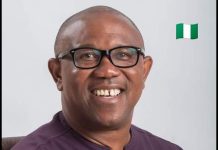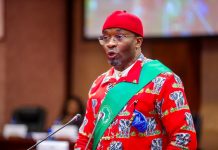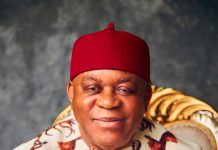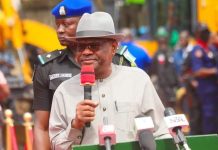The Secretary General of the Conference of Nigeria Political Parties (CNPP), the umbrella body of all political parties and associations in Nigeria, Chief Willy Ezugwu, has said that Nigeria is yet to get its presidential system right.
Ezugwu who is also a chieftain of the All Progressives Grand Alliance (APGA), the National Coordinator of South East Revival Group (SERG) and Convener of the Save Enugu Group (SEG), pointed out that with what was seen during the American presidential election, Nigeria still has a long way to go to perfect its own system.
In this interview, he also spoke on the anti-graft war in the country just as he commended Governor Ifeanyi Ugwuanyi for the good work he is doing in Enugu State.
As the Secretary General of CNPP, how would you like to compare the American presidential system and the version of democracy we practise here in Nigeria in view of the just concluded presidential election in the United States and the transition process in that country, I know you just came back from there?
I don’t think there is basis to compare the two presidential systems. For instance, in Nigeria, there is no organized presidential or governorship debate, which the candidates must attend to sell their ideas to the electorate to enable them make informed choices as to which candidate has the capacity to make their lives better. In Nigeria, you can decide not to attend any pre-election debate with co-contestants. So, the choice of a president or governor most times is based on manipulation and not on the ability of the eventual winner to perform. Secondly, the ‘In’ in the Independent National Electoral Commission has been technically removed that they are no more independent. The principal officers of the electoral bodies look the other way during elections. So, the electoral umpire at the federal and state levels work only to ensure the return of the candidate of the ruling party. But in America, you see the incumbent working very hard to sell the candidate of his party unlike in Nigeria where everything is based on imposition. You can see that the President-elect of the US, Donald Trump, has been working for the people, even before his swearing-in. He is already making appointment with a view to fulfilling his campaign promises. But in Nigeria, electoral promises are either denied out rightly or thrown to the dust bin. You can see he is already discussing with investors and a Japanese firm has agreed to bring in $50 billion in form of Foreign Direct Investment (FDI) into the United States’ economy, which will create 50, 000 jobs for the citizens. He has named captains of industries and business moguls as members of his cabinet with a view to transforming the United States economy unlike where we wait until after swearing-in before we waste several months in search for appointees. Also, he has negotiated for Carrier Air-conditioners that left the U.S. to return to America and that means more jobs and he has not been sworn-in. There are a lot other examples to cite, but for want of time and space. In fact, our own practice is a sadistic democracy, where our leaders have no moral ground to fight corruption because it is either their victory was manipulated or stolen funds were used to finance it. How would you truly fight corruption if you are a product of corruption?
But there seems to be a departure from the past in Nigeria on the anti-corruption fight under the President Muhammadu Buhari’s administration?
As far as I’m concerned, and as I said earlier, no leader has the moral ground to fight corruption. The system that is fighting corruption in Nigeria is endemically corrupt. For instance, an anti-corruption whistle blower, Dr George Uboh has written to the President and all the organizations, including CNPP, on certain amount of money recovered by the Economic and Financial Crimes Commission (EFCC), which were not remitted to the Federal Government’s treasury. He alleged that the recovered loots have been looted, yet nobody has done anything about it. Secondly, the recent alarm raised by former EFCC chairman, Farida Waziri that the Commission from Nuhu Ribadu till date is still withholding recovered looted fund and that it was even used for election purposes. A former EFCC Chairman, Ibrahim Lamorde, was invited up to six times by the Senate to account for recovered funds by the Commission and he refused to honour the invitation and they later issued a bench warrant for his arrest. But instead of compelling him to honour the Senate’s invitation, the Federal Government sent him to NIPSS for a course and he has now been redeployed to the Police anti-Fraud unit as the head of the SFU. Can you imagine that? Is that how to fight corruption? Can you give me any serious concluded case of corruption under this administration apart from victimization of political opponents?
Recently, you commended Governor Ifeanyi Ugwuanyi for being among three state governors who are paying regular salaries; what informed your position, knowing that the governors were supposed to pay salaries to their workers?
Yes, it is the duty of the governors to pay salaries and I equally commended the other two governors. But as I said earlier, Enugu State is a civil servant-based, not an oil producing state with 13 per cent derivation added to their monthly allocation. However, there are three categories of states in the report which I responded to, and Enugu State was in the first category with two other states – Lagos and Rivers. The first category was states that pay regular salaries, the other has about eight states that partly pay while the third category were the states that are owing several months in arrears of workers’ salaries. For Lagos, it can be argued that the state gets billions of naira monthly internally generated revenue due to its commercial nature, just as it can be argued that Rivers State is an oil producing state. Yet, Governor Ugwuanyi was named among the governors in the first category. It is a shame that oil producing states owe salaries while non-oil producing states like Enugu does not. If Governor Ugwuanyi is able to do all he is doing in terms of infrastructure on ground and still pay salaries regularly, I must commend him. Go and see what the government of Enugu State is doing across the state; he is not just patching roads, he is building new ones, opening up the rural areas with interconnecting roads. These are solid roads that can be compared with any road in any part of the world in standard. If you get a governor that is working like Ugwuanyi, despite lean allocation from the Federal Government, you cannot but commend the man at the helm of affairs. For me, Governor Ugwuanyi is working despite all distractions, particularly from Fulani herdsmen, who are killing and destroying farmlands in the state. I don’t just criticize for the sake of it; I engage in constructive criticisms. If you are doing well, I will commend you. That is my own type of activism.
Source: sun








